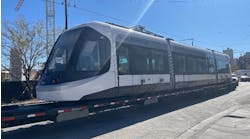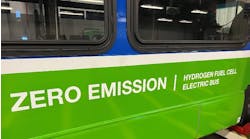NV: Fuel Tax Indexing Approved in Clark County to Fund Critical Transportation Projects
During the Clark County Commission's Sept. 3 meeting, the Board of Commissioners approved an ordinance, that will index the fuel tax to inflation in Clark County, raising up to $700 million for critical transportation infrastructure projects throughout southern Nevada.
The ordinance will go into effect on Jan. 1 and last through Dec. 31, 2016, resulting in an approximate 3-cent increase per gallon of gas per year. As a result, the annual impact to an average driver in southern Nevada equates to roughly a dime a day over the next three years. The ordinance was supported by the Regional Transportation Commission of Southern Nevada (RTC) and member entities.
“We’re grateful that the Clark County Board of Commissioners voted to approve indexing the fuel tax to inflation. This will enable the RTC to raise the revenue necessary to fund critical transportation projects in and around the Las Vegas Valley, benefiting hundreds of thousands of motorists and creating nearly 8,931 to 9,467 person years of employment” said Tina Quigley, RTC general manager. “This initiative will improve connectivity and enhance transportation infrastructure in Southern Nevada allowing residents, tourists and goods to travel more efficiently into and around Las Vegas.”
Indexing the fuel tax to inflation in Clark County will allow the RTC to issue bonds to fund 183 regionally significant transportation projects, including developing Interstate 11, widening U.S.-95 in the northwest part of Las Vegas from Ann Road to Kyle Canyon, bringing the 215 Beltway to freeway standards, and making design improvements on heavily traveled corridors like Maryland Parkway and Paradise Road.
“Indexing fuel tax not only funds road projects but also creates critically needed jobs, helps to broaden development, and encourages economic growth. For these reasons, it received support from myriad of partners, including the local business community, elected officials and key stakeholders,” said Clark County Commissioner Larry Brown, chairman of the RTC. “This truly was a community effort to make the necessary investment to secure our future economic growth.”
“As neighboring metropolises like Denver, Phoenix and Salt Lake City continue to bolster their transportation infrastructure investment, this initiative will help to keep Las Vegas competitive in the southwest region,” added Patrick Smith, spokesperson with the Nevada Economic Development Coalition.
With the indexing ordinance passing, Clark County joins Washoe County in northern Nevada as the two counties in the state that use fuel tax indexing to fund transportation infrastructure projects. All project funds generated in Clark County will go toward projects in Clark County. Without indexing, the RTC estimated having only $22.4 million a year over the next 10 years to spend on local street and highway projects – equivalent to building one interchange per year, one mile of roadway per jurisdiction per year or one beltway segment without bridges per year.
“Figuring out how best to raise revenue to fund roadway projects is an issue that not only affects Clark County but our entire nation,” Quigley added. “We believe that indexing the fuel tax to inflation is the quickest alternative with the least impact on our community to help address our streets and highways budget that will allow us to help create a transportation vision for our future.”


